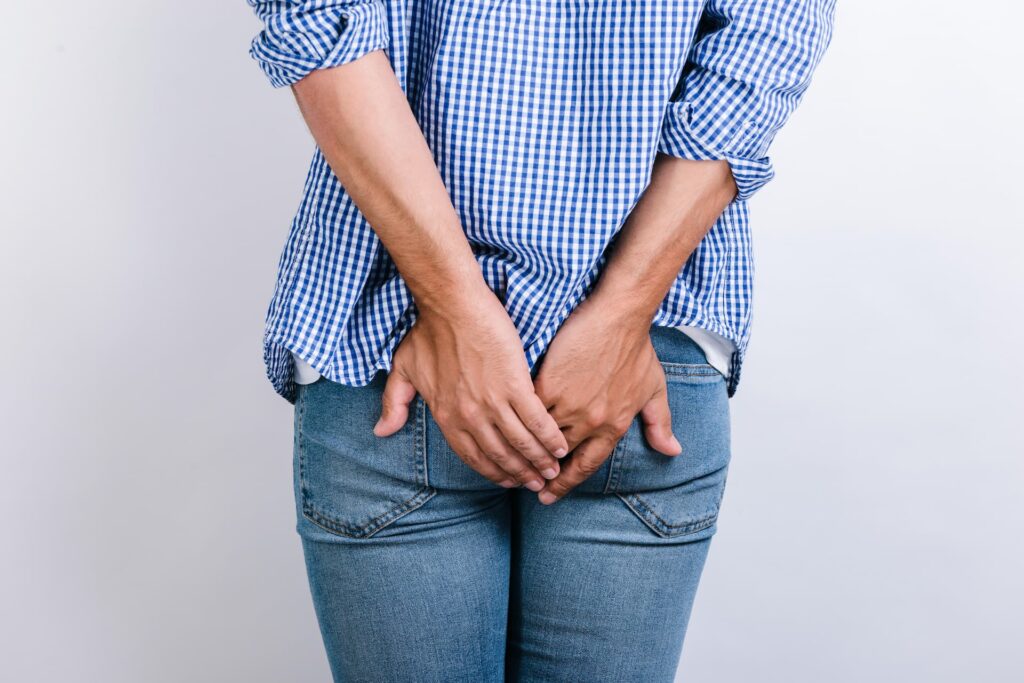What is the eXroid® treatment?
Haemorrhoids (piles) are very common and their symptoms can often disappear on their own after a few days. However, sometimes the symptoms of itchiness, discharge, soreness and bleeding from your bottom don’t go away and require treatment.
The most commonly known treatment options to remove haemorrhoids are surgical, often leading to long recovery time and higher risk of complications. eXroid® offers a non-surgical alternative and the treatment:
- Treats all four grades of internal haemorrhoid disease (no other treatment can treat all 4 grades)
- Requires no hospital stay, no bowel prep and no anesthesia so you can walk in and out with no down time required
- Is quick & convenient
- Is only uncomfortable, though not painful for most
- Has a high success rate – many patients only require one treatment.
The eXroid® procedure uses electrotherapy, which has been clinically researched for over 150 years. It is a low risk treatment which is very effective for a range of patients.
This treatment is currently available at the Healthshare Clinic Winchester.

Ready to book now? Get in touch to discuss your needs and decide on the best course of treatment for you.
Ready to book now? Get in touch to discuss your needs and decide on the best course of treatment for you.
What does an eXroid® procedure involve?
eXroid® treatment is non-surgical and is carried out in a clinic by a specialist consultant. There is no cutting, stitching or heat applied and no anaesthetic required, meaning no time off work or prolonged down-time. Appointments (including diagnosis & treatment) can take less than an hour, so you can fit your appointment conveniently around your life.
The procedure is carried out with you lying on your side, with knees slightly bent. The consultant uses a proctoscope (a small plastic tube), inserted via your bottom to enable a clear view of the haemorrhoid(s). Often this is the part that can feel uncomfortable, rather than the procedure itself. A low electrical current stimulates a chemical reaction, which seals off the feeding blood vessels, resulting in the haemorrhoid being starved of its blood supply and shrinking. This reduces the symptoms experienced.
Over 90% of patients who have the eXroid® electrotherapy haemorrhoid treatment report a return to their normal activities on the same day.
The effect continues to work to close the vessels for up to 4 weeks. The aftercare team will be in touch at this point to hear your progress, review your doctor notes and talk to you about the need for any further treatment.
Who is eligible for eXroid® treatment?
The eXroid® treatment is suitable for all 4 grades of internal haemorrhoids. eXroid is not currently available on the NHS, however, as this is offered privately, this means there are no waiting lists, with appointments usually available within 2 weeks.
The grading system for haemorrhoids is as follows:
- Grade I: Haemorrhoid protrudes into the anal canal but does not prolapse outside the anus
- Grade II: Haemorrhoid protrudes through the anus during straining or evacuation butreturns spontaneously
- Grade III: Haemorrhoid protrudes through the anus during straining or evacuation but needs to be manually returned to position
- Grade IV: Haemorrhoid remains prolapsed outside of the anus.
Many patients can confuse prolapsing haemorrhoid with external haemorrhoids and therefore think they cannot be treated with the eXroid® treatment. The only way to correctly diagnose the type of haemorrhoids present is to have an examination by a specialist.
What complications can happen?
No treatment is without risks or 100% effective for all patients. Complications may include:
- Rectal bleeding, but this is usually only temporary and goes away on its own. Rectal bleeding is more likely if there has been recent bleeding from the piles
- Some patients will experience sensitivity of the skin on their left hip for up to 48 hours following treatment. This is due to where a saline soaked sponge pad rests during the treatment.
Where there is any post treatment pain, it is usually eased with simple over-the-counter painkillers such as paracetamol.

Understanding your symptoms
Experiencing the symptoms of piles can be scary at times and it can be hard to know when it might be time to seek help and do something more about it.
We have introduced a quick on-line questionnaire here for you to understand the severity of your symptoms and what to do next.
It takes less than a minute to complete and you will receive your personal score, an assessment tool to take to your GP and tailored advice by email.
Get in contact
This service is booked directly with eXroid. Please choose your preferred way to get in contact with them below.
Call: 0800 999 3777
Book a call back:
Schedule a call at a time to suit you by clicking the button below. This will book a slot straight in to the eXroid Patient Services calendar.FAQs
Where can I get eXroid® treatment?
This treatment is available at the Healthshare Clinic Winchester. Use the contact form above to enquire today.
Can haemorrhoids go away on their own?
Haemorrhoids do often go away on their own. However, sometimes the symptoms of itchiness, discharge, soreness and bleeding from your bottom don’t go away and require treatment.
Do piles cause colon cancer?
There is no evidence to suggest that piles lead to cancer. This myth exists because there are some similarities in the symptoms of both conditions, such as bleeding from the anus.
Can exercising cause piles?
Some types of movements during a workout can put a strain on the muscles around the anus.
This can cause problems. For example, excessive strain or incorrect technique from activities such as weight lifting can increase your chances of developing haemorrhoids.
However, that should not put you off working out because exercise is key to a healthy, active life.
Can anyone get piles?
People of any age can get piles, but as you get older the likelihood of developing piles increases. This is because supporting tissues in the anal canal and rectum areas weaken as you age. Other factors such as constipation, diarrhea and straining when you go to the toilet can affect anyone at any age.
How long does eXroid® treatment take?
It can take up to 10 minutes for each haemorrhoid, or up to 30 minutes for one session treating 3 piles. An initial consultation and treatment takes 45 – 60 minutes.

